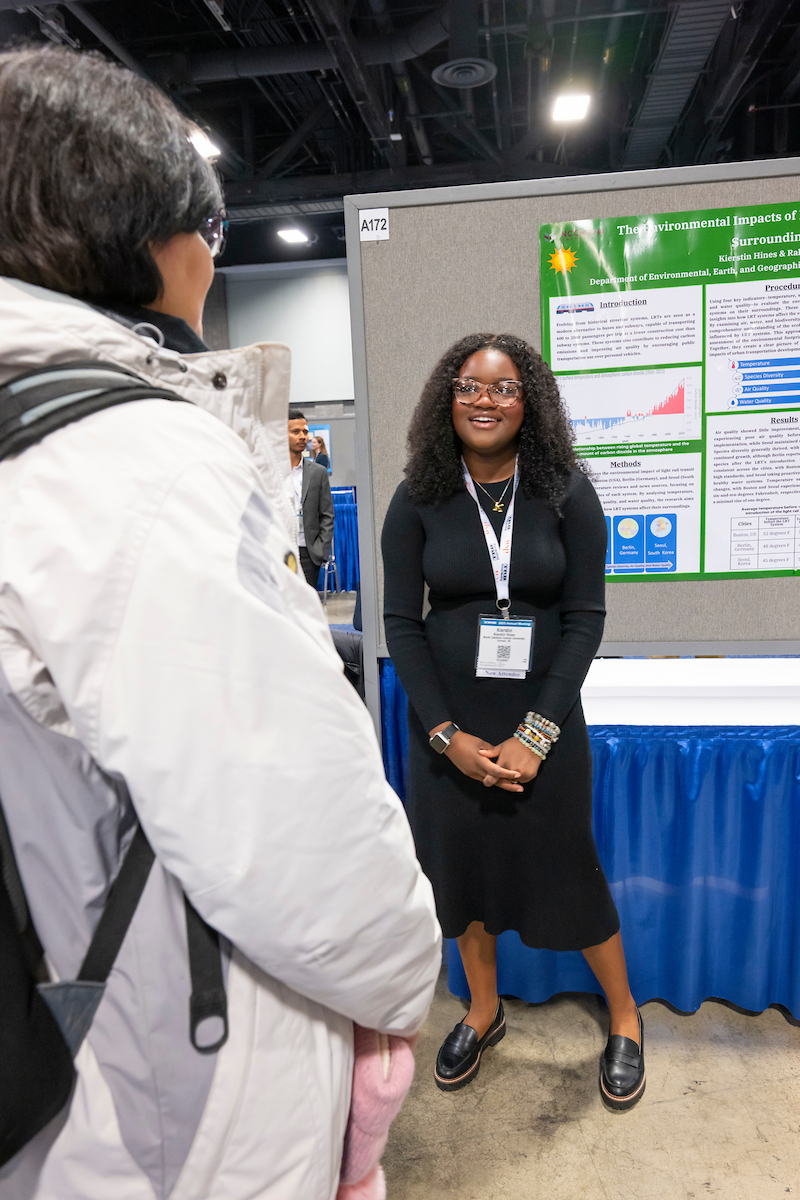First-year criminal justice graduate student Le’Monna Cox once dreamed of becoming a civil rights attorney. But as an undergraduate at North Carolina Central University (NCCU), she discovered a passion for research while taking a crime mapping course in the department of environmental, earth and geospatial sciences (EEGS).
“Research allows you to be nosy, ask questions and review data that supports your work,” said Cox. “I love learning about innovative things.”
For her final project, Cox focused on the rise in motor vehicle thefts in Durham —especially around NCCU’s campus.
“I asked my professor if he had heard about cars being stolen in the area,” she said. “He didn’t know too much about it but thought it would be a great topic for my final project.”
Cox conducted a spatial and temporal analysis of vehicle thefts from 2020 to 2024, using geospatial tools to map the NCCU area within a one-mile and five-mile radius.
“I broke Durham into block groups, or sub-communities, and found that vehicle theft was more frequent around NCCU than in other parts of the city, including Duke University and Durham Tech,” she said.
Her research was such a success that her professor recommended her for the Transportation Research Board (TRB) 2025 Minority Student Fellows Program,
which supports underrepresented minorities in the transportation field and provides funding for students to present their work at the TRB Annual Meeting.

Cox was accepted to the program, giving her the opportunity to display her research on a national stage. “It was a fantastic experience,” said Cox. “I had a bit of imposter syndrome at first because I wasn’t an EEGS major. But when I got there, I met fellows from all different backgrounds - English, engineering, you name it. We all came together to tackle transportation-related issues from around the world. I felt seen, and I made lifelong friends.”
Kierstin Hines, a sophomore EEGS major, was also selected for the fellowship program and described the opportunity as transformative.
“It was amazing to be around professionals who were all focused on solving the same problem,” she said. “Everyone was so passionate, and all the fellows were really welcoming. It allowed me to merge my interests in the environment and transportation.”
Since childhood, Hines had been fascinated by the natural sciences, often watching space and environmental documentaries.
“It wasn’t a career path that was talked about much, so I didn’t think I could do anything in that field,” she said. “But at NCCU, I discovered so many opportunities, and EEGS became the perfect path for me to pursue environmental law.”
For her TRB research presentation, Hines explored the environmental impact of light rail systems in major cities, analyzing transit networks in Boston, Berlin and Seoul.
“I studied communities located within 20 miles of these systems, looking at factors like temperature changes, species diversity, air quality and water quality,” she said.
Her findings revealed that light rail systems had a net positive effect.
“The transit systems actually boosted the surrounding areas rather than harming them,” she said. “They helped the communities thrive.”
With the TRB conference behind her, Hines is now shifting her focus to the aftermath of Hurricane Helene in North Carolina.
“I’m working with Dr. (Zhiming) Yang to develop a topographic wet index to help communities predict and prepare for potential flooding,” she said.
As for Cox, her research continues in a new direction. She is now studying the representation of Black women in criminal justice programs and comparing their research publication rates to their white counterparts. She recently presented her findings to the North Carolina Criminal Justice Association and plans to pursue a Ph.D. in criminology.
